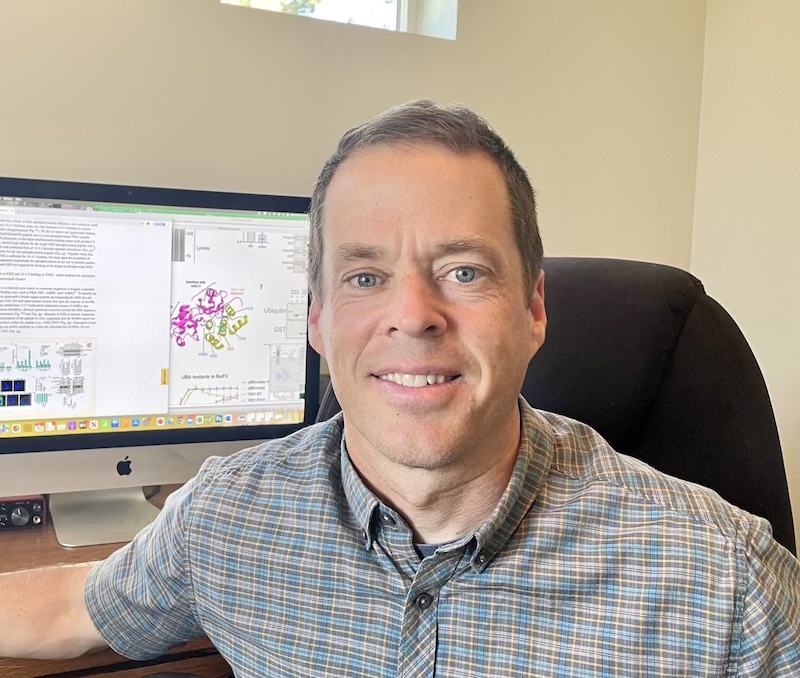Josh Andersen
Associate Professor of Oncological Sciences
Cell Signaling, Molecular Mechanisms, Kinase Regulation, Autophagy, Cell Survival, Cell Growth
Molecular Biology Program
Biological Chemistry Program
Education
B.S. Brigham Young University
Ph.D. University of Utah
Research
We combine molecular and biochemical approaches with proteomics to discover mechanisms that control tumor cell growth and survival. A better understanding of these mechanisms gives us tools to develop more effective and targeted cancer therapies.
Decoding the language of cell signaling
All of the projects in our lab are linked together by a common interest in cell signaling—specifically,
how dynamic post-translational modifications (PTMs) control all aspects of tumor cell
biology, including immune signaling, cell survival, metastasis, and growth.
Modern proteomics has uncovered over 600,000 PTMs across the human proteome and these PTMs come in over 200 varieties. However, we only know the function of a tiny fraction of these PTMs, which limits our ability to manipulate tumor cell biology with therapeutics. We aim to fill this gap with a variety of approaches that include the following major projects:
- Harnessing the oncogenic phospho-binding protein 14-3-3 as a biological probe to identify mechanisms of tumor cell growth and survival. 14-3-3 proteins interact dynamically with phosphorylated "client" proteins to control essentially every major cellular process. Our lab harnesses 14-3-3 as a proteomics probe to quickly identify functional phosphorylations (drilling through the noise in the phospho-proteome) that control important aspects of tumor biology. This approach has been a source of many fruitful projects in the lab in the fields of autophagy, kinase biology, and cell cycle regulators.
- Discovering the function and regulatory mechanisms of understudied kinases. For a cell to become cancerous, it must acquire (e.g., via mutation) the activity of pro-growth kinases. Yet despite the importance of kinases as therapeutic targets in cancer, over 25% of the 634 kinases in our cells are still understudied, leaving >100 kinases untapped as potential therapeutic targets. Our recent work in this area focuses on the mysterious ACK family (TNK1 and ACK1) of tyrosine kinases and includes molecular/mechanistic, structural, and translational aims. Additional earl-stage projects in the lab focus on other unusual and understudied kinases.
- Uncovering mechanisms of basal autophagy. Tumor cells rely on basal autophagy to rid themselves of toxic protein aggregates, defective mitochondria, and other cellular debris. However, the core mechanisms of basal autophagy are still poorly understood. Our recent work focuses on how the first steps in basal autophagy are regulated, and how disruption of these steps activates pro-inflammatory signaling—a cancer vulnerability that we are trying to exploit to improve treatment.
- Developing computational approaches to more efficiently identify PTMs that control cancer cell fate. In parallel to our wet lab approaches, we are developing machine learning-based apps that consider aspects of protein structure and sequence, cancer-associated mutations, and PTM proteomics data to quickly identify functional PTMs. These apps help seed exciting new projects in the lab. Our recently published app to identify 14-3-3 client phospho-binding sites can be accessed here: https://rconnect.byu.edu/14-3-3-site-finder/
References (Selected Publications)
- Egbert CM, Warr LR, Pennington KL, Thornton MM, Vaughan AJ, Ashworth SW, Heaton MJ, English N, Torres MP, Andersen JL (2023). The Integration of Proteome-Wide PTM Data with Protein Structural and Sequence Features Identifies Phosphorylations that Mediate 14-3-3 Interactions. J Mol Biol, 435(2), 167890.
- López-Palacios TP, Andersen JL (2022). Kinase regulation by liquid-liquid phase [Review]. Trends Cell Biol.
- Pennington KL, McEwan CM, Woods J, Muir CM, Pramoda Sahankumari AG, Eastmond R, Balasooriya ER, Egbert CM, Kaur S, Heaton T, McCormack KK, Piccolo SR, Kurokawa M, Andersen JL (2022). SGK2, 14-3-3, and HUWE1 Cooperate to Control the Localization, Stability, and Function of the Oncoprotein PTOV1. Mol Cancer Res, 20(2), 231-243.
- Kannangara AR, Poole DM, McEwan CM, Youngs JC, Weerasekara VK, Thornock AM, Lazaro MT, Balasooriya ER, Oh LM, Soderblom EJ, Lee JJ, Simmons DL, Andersen JL (2021). BioID reveals an ATG9A interaction with ATG13-ATG101 in the degradation of p62/SQSTM1-ubiquitin clusters. EMBO Rep, 22(10), e51136.
- Chan TY, Egbert CM, Maxson JE, Siddiqui A, Larsen LJ, Kohler K, Balasooriya ER, Pennington KL, Tsang TM, Frey M, Soderblom EJ, Geng H, Müschen M, Forostyan TV, Free S, Mercenne G, Banks CJ, Valdoz J, Whatcott CJ, Foulks JM, Bearss DJ, O'Hare T, Huang DCS, Christensen KA, Moody J, Warner SL, Tyner JW, Andersen JL (2021). TNK1 is a ubiquitin-binding and 14-3-3-regulated kinase that can be targeted to block tumor growth. Nat Commun, 12(1), 5337.
- Yan D, Franzini A, Pomicter AD, Halverson BJ, Antelope O, Mason CC, Ahmann JM, Senina AV, Vellore NA, Jones CL, Zabriskie MS, Than H, Xiao MJ, Scoyk AV, Patel AB, Clair PM, Heaton WL, Owen SC, Andersen JL, Egbert CM, Reisz JA, AD’Alessandro A, Cox JA, Gantz KC, Redwine HM, Iyer SM, Khorashad JS, Rajabi N, Olsen CA, O’Hare T, Deininger MW (2021). A critical role for SIRT5 in acute myeloid leukemia Blood Cancer Discov, 2(3), 266-287.

